The success of a corporate event relies on a multitude of factors, including but not limited to the performance and the efficiency of the events team. From planning and coordination to execution and post-event analysis, the team’s performance plays a crucial role in determining the overall success of an event. Providing comprehensive training to team members is, therefore, essential to equip them with the tools and expertise required to navigate the complexities of corporate event planning.
If you are a corporate event organiser or a business that wants to assemble and train its events team, you have come to the right page! In this article, we aim to equip event organisers with the team training strategies they need to train and empower a high-performing events team. But first things first, let’s understand how you can put together an events team you can rely upon.
How to Assemble a Reliable Events Team
Putting together a solid team for event planning and management requires careful consideration and strategic decision-making. Here are some steps to help you assemble an effective team:
- Outline the Roles and Responsibilities: Start by outlining the key roles and responsibilities needed for your event. These may include event coordinator, logistics manager, marketing specialist, finance manager, and more. Clearly defining roles ensures that every aspect of the event is covered and each team member knows their specific duties.
- Identify Required Skills and Expertise: Determine the skills and expertise necessary for each role based on the requirements of your event. Look for team members with relevant experience in event planning, project management, communication, budgeting, and problem-solving. Diversity in skills and backgrounds can bring fresh perspectives and ideas to the team.
- Recruit Team Members: Seek out individuals who possess the skills and experience needed to fulfil each role effectively. Consider recruiting from both within your organisation and externally, depending on the resources available and the scope of the event. Look for candidates who are passionate, adaptable, and committed to the success of the event.
By following these steps and assembling a diverse and capable team, you can increase the likelihood of success for your event and create memorable experiences for attendees.
How to Provide Comprehensive Training to Your Events Team
Comprehensive training ensures that every member of the team is well-equipped to handle their respective responsibilities and contribute to the overall success of the event. Here are some essential strategies you can utilise when training your events team:
Deliver Tailored Training Sessions
Tailoring training sessions to specific roles and responsibilities within the event team is crucial for addressing the unique requirements of each position. By customising training content to align with the tasks and challenges faced by team members, organisers can ensure relevance and effectiveness.
Example: For event coordinators responsible for vendor management, training sessions may focus on negotiation techniques, contract management, and vendor relations to equip them with the skills needed to secure the best deals and maintain positive relationships with suppliers.
Organise Hands-on Workshops
Practical workshops and simulations offer invaluable opportunities for team members to apply their skills in real-life scenarios. By simulating common challenges and emergencies, individuals gain practical experience and confidence in their ability to handle unexpected situations during the event.
Example: Hosting a mock event where team members are tasked with managing various aspects, such as registration, logistics, and guest services, allows them to practice their skills in a controlled environment. Feedback and debriefing sessions following the simulation provide valuable insights for improvement.
Leverage Online Resources
Leveraging online platforms and resources enhances accessibility and flexibility in training delivery. Online modules, webinars, and tutorials provide supplementary learning materials and assessments, allowing team members to learn at their own pace and revisit content as needed.
Example: Providing access to online resources such as training videos, industry articles, and best practice guides allows team members to deepen their understanding of event management concepts and stay updated on the latest trends and techniques.
Offer Mentorship Programs
Implementing mentorship programs pairs experienced team members with newcomers to provide guidance, support, and knowledge sharing. Mentors can offer valuable insights, share best practices, and provide advice based on their own experiences in event management.
Example: Pairing junior event planners with seasoned professionals allows them to learn from their mentor’s expertise and gain valuable insights into the intricacies of event planning. Regular mentorship meetings and feedback sessions facilitate ongoing learning and development.
Role-playing Exercises
Role-playing exercises simulate real-world scenarios and allow team members to practice their communication, problem-solving, and decision-making skills in a safe environment. These exercises help build confidence and prepare team members to handle challenging situations during events.
Example: Conducting role-playing exercises where team members take on different roles, such as event coordinator, vendor, or attendee, allows them to experience various perspectives and understand how their actions impact others. Debrief sessions provide opportunities for reflection and learning.
Invest in Continued Learning
Beyond initial training, investing in continued learning and professional development is essential for keeping team members engaged and up-to-date with industry developments. Encouraging participation in industry conferences, workshops, and certification programmes allows team members to expand their knowledge and skills, ultimately contributing to the ongoing success of the team and the events they manage.
With this kind of comprehensive training, the event management team can be prepared well in advance to handle the complexities of organising corporate events. They will be able to navigate logistical challenges with ease, provide seamless support to attendees, and effectively manage unexpected issues as they arise.
Strategies for Effectively Managing Your Events Team
Establish Clear Roles and Responsibilities
Effective event management begins with clarity in roles and responsibilities. Without a clear understanding of who is responsible for what, tasks can easily slip through the cracks, leading to confusion and inefficiency. Here are some strategies for setting clear roles and responsibilities:
- Team Assessment: Conducting a comprehensive assessment of team members’ skills, experience, and strengths allows organisers to assign roles that align with individual capabilities. This not only ensures that tasks are delegated effectively but also fosters a sense of ownership and accountability within the team.
- Detailed Job Descriptions: Detailed job descriptions and task lists provide a clear roadmap of duties associated with each role. By outlining responsibilities explicitly, team members have a clear understanding of their contributions to the event’s success, promoting accountability and clarity.
- Regular Team Meetings: Open communication in regular team meetings is vital for clarifying roles and responsibilities. These meetings provide an opportunity for team members to discuss and assign tasks collaboratively, resolving any ambiguities and ensuring alignment towards common objectives.
Foster Effective Communication
Communication lies at the heart of effective team collaboration and coordination in event management. When we were planning a high-profile conference, regular team meetings and email updates kept our team members informed about project progress and upcoming deadlines. Not just that, our open communication approach enabled the team to address any issues promptly and ensure that the event proceeded smoothly. This is why clear and consistent communication channels are essential for ensuring that all team members are informed and aligned with the event objectives.
To foster effective communication, here are some strategies to consider:
- Establishing Regular Channels: Implementing regular communication channels such as team meetings, email updates, and messaging platforms ensures that information flows seamlessly within the team. Consistency in communication helps in keeping everyone informed about important updates and changes.
- Encouraging Active Listening: Encouraging active listening among team members fosters a culture of open communication and mutual understanding. By actively listening to each other’s perspectives and concerns, team members can collaborate more effectively and address challenges proactively.
- Implementing Communication Tools: Leveraging communication tools and technologies such as project management software and collaboration platforms streamlines communication and enhances team collaboration. These tools facilitate real-time communication, document sharing, and task tracking, thereby improving overall efficiency.
Encourage Collaboration and Teamwork
When we organised a large-scale charity gala, cross-functional collaboration between event planning, marketing, and fundraising teams resulted in a successful event that exceeded fundraising targets. By leveraging each team’s expertise and working together towards a common goal, the event organisers maximised impact and achieved significant success.
This is why we believe collaboration is essential for achieving collective goals and fostering a culture of teamwork within the event team. By working together towards a common objective, team members can leverage each other’s strengths and expertise to overcome challenges and achieve success.
Here are some time-tested strategies for promoting collaboration and teamwork:
- Facilitating Team-building Activities: Organising team-building activities and exercises promotes bonding and camaraderie among team members. These activities create opportunities for team members to get to know each other better, build trust, and strengthen relationships, enhancing overall teamwork.
- Encouraging Cross-functional Collaboration: Encouraging collaboration across different departments and functional areas promotes knowledge sharing and innovation. By breaking down silos and encouraging collaboration, organisations can leverage diverse perspectives and expertise to solve problems more effectively.
- Recognising and Rewarding Collaboration: Recognising and rewarding collaborative efforts fosters a culture of teamwork and motivation within the team. Whether through verbal praise, incentives, or team rewards, acknowledging contributions reinforces positive behaviour and encourages continued collaboration.
Conduct Ongoing Evaluation and Collect Feedback
Following a corporate team-building retreat, the event organisers conducted a post-event debrief session to gather feedback from participants. Through open discussion and feedback surveys, organisers gained insights into the retreat’s effectiveness and identified areas for improvement in future events. This is why continuous evaluation and feedback are essential for identifying areas of improvement and refining team performance throughout the event lifecycle. By soliciting feedback and analysing performance metrics, event organisers can make informed decisions and drive continuous improvement.
Here are some strategies to collect feedback and analyse team performance:
- Post-event Debrief Sessions: Conducting post-event debrief sessions allows team members to reflect on the event’s successes and challenges. These sessions provide an opportunity to identify lessons learned, discuss areas for improvement, and develop action plans for future events.
- Soliciting Feedback: Actively soliciting feedback from team members, stakeholders, and attendees provides valuable insights into the event’s effectiveness and areas for improvement. Whether through surveys, interviews, or informal discussions, gathering feedback allows organisers to understand perspectives and address concerns.
- Analysing Performance Metrics: Analysing performance metrics such as attendee feedback, revenue generated, and event metrics provides objective data for evaluating event success. By tracking key performance indicators, organisers can identify trends, measure success against goals, and make data-driven decisions for future events.
Final Thoughts
Investing in team training is not just about ensuring the success of a single event but about building a culture of excellence and continuous improvement within the organisation. By fostering effective communication, encouraging collaboration and teamwork, and conducting ongoing evaluation and feedback, event organisers can build high-performing teams capable of delivering exceptional event experiences. These strategies are essential for driving continuous improvement and achieving success in event management, delivering exceptional event experiences that leave a lasting impact on attendees and stakeholders alike.
With a solid team of professionals boasting decades of combined experience in the field of corporate event management, we understand the intricacies involved in successfully delivering corporate events. From meticulous planning to flawless execution, our team is committed to delivering a memorable event experience. To partner with us for organising your next corporate event, contact us today!



